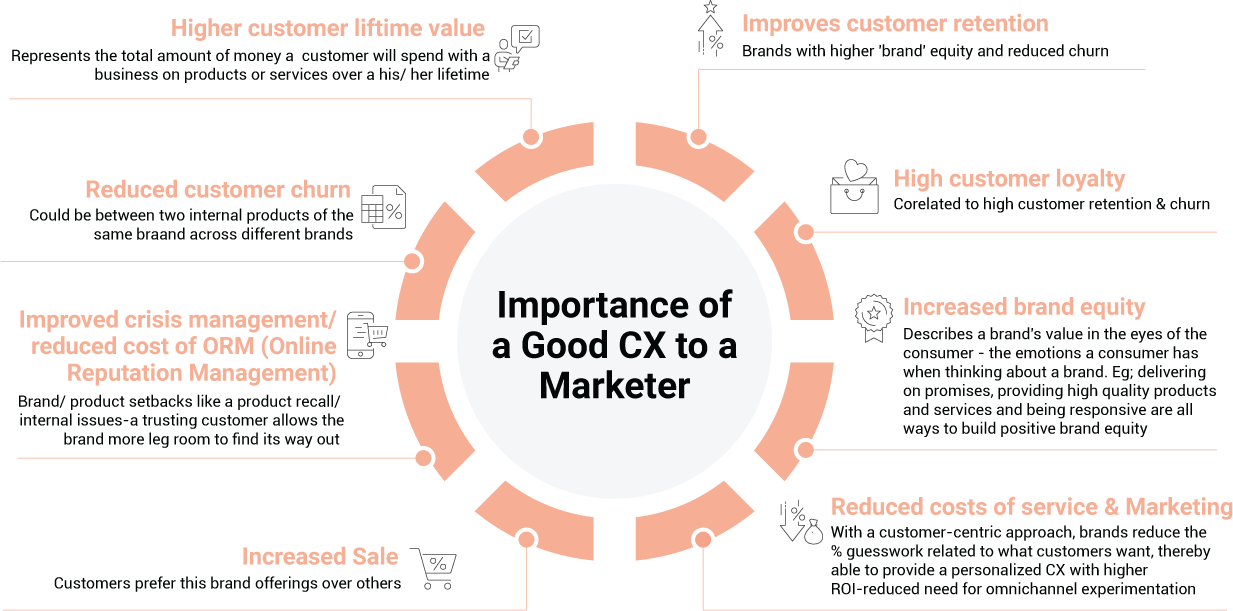Menu


-
Responsible Data
(THE PRIVACY – PERSONALIZATION TRADE OFF)
Right to Privacy
The Right to Privacy is recognized as a basic human right under Article 12 of the Universal Declaration of Human Rights Act, 1948.
In the Republic of India, the right to privacy is protected as an intrinsic part of the right to life and personal liberty under Article 21 and as a part of the freedoms guaranteed by Part III of the Constitution.
The Impact of a Good Personalized (Content) Experience on a Customer:
Customers’ holistic perception of their experience with the business or brand results in better customer satisfaction. A good customer experience has higher probability of a long-term brand association/loyalty and a positive word-of-mouth in the society at large. The cost of customer retention, win back and acquisition reduces:
• Implicit vs Explicit consent(Customer Experience) should be the key focus for a successful marketing/digital strategy The Art of Personalization
Personalization helps gain insights into a customer’s preferences and intent through data, thereby offering them tailored experiences which then improves brand loyalty. To achieve this, the brand needs to process and profile the customer behaviour and demographic information which is where the principles of data privacy get applied. How many of us wilfully give consent to access our personal information? How can the brand perform customizations legally with most customers unwilling to approve usage of their data?
The answer lies with how brands like Amazon, Zomato and Swiggy manage this need.
Their entire customer experience is to provide a recommendation that’s relevant to the customer in question. They try to summarize the outcome; it is never very specific, yet relevant. Say, customers who bought this product, next bought these products. Personalization helps brands up-sell, cross-sell as well as win-back customers.
When customers sign-up to brands whose USP is to provide a personalized experience following the key principle of ‘Privacy and Security by Design’, a lot of the customer reservation ceases to exist as the customer is tuned to the brand motto and is willing to co-operate with necessary (personal) details to benefit from the brands offering. Today’s generation will look for such brands that balance the best of both worlds – Privacy & Security of their data with an excellent Customer Experience.
The Data Privacy laws across the world have few things in common, first is to encourage the use of anonymous information thereby ensuring a breach of that (anonymized) data, falls outside of the scope of the regulation & penalties. In most cases, a brand will need PII (Personally Identifiable Information) to achieve
-
micro-segmentation, to provide a custom solution & a unique experience to the customer. The laws then mandate taking an explicit consent from the data principal/subject.
Brands need to communicate unambiguously the benefits to be experienced by the end customer, for which they wish to collect & process specific personal details (of the customer) in addition to providing assurance (to the customer) that the (collected) information shall be used only for the intended purpose and kept secure throughout its retention period. The brands need to provide control to the customer to manage their data as they need.
The laws mandate that unless explicitly opted-in, a customer is treated as opted-out. In case of a customer complaint, the brand needs to support with evidence of the customer’s (explicit) consent to receive the said benefit.
Key Challenge for a Marketer
Every marketer will wish to have the ability to maximize legal usage of PII (Personally Identifiable Information) both for providing real time & just-in-time dynamic hyper-personalized targeted relevant communications & offers (to end customers) as well as to perform micro–data analysis to reduce cost of operations and increase ROI.

-
Myths about Data Security & Privacy in the world of Personalization
Data Security & Privacy Controls hinder customer experience
Data Security & Privacy Controls are designed to protect user/customer data from misuse by the organization or prevent unauthorized access. A good data security & privacy control gives confidence to customers to trust the brand with their PII data. Every ethical business should have an ethical data policy. Customers want a good experience, however, do not wish to share their PII data
Consumers are wary about entrusting their data to third parties particularly if they believe their data is vulnerable to breaches. How companies store and handle personal data is also a major driver of behaviour and loyalty, particularly if consumers believe it is being given away without permission. A study by Oliver Wyman revealed that consumers are concerned about both data protection and data privacy, with around 57% customers expressing concerns about online privacy and 85% wanting to know more about what happens to data that companies collect. On the other hand, customers are willing to share their PII provided they get good benefits. E.g., A frequent-flyer customer willing to apply for a credit card which offers airport lounge access, higher reward points etc. Data Privacy regulations are restrictive - customers will no longer allow firms to collect & process their personal data
Experience shows that consumers are still willing to have their personal data stored and collected, but only if there is a clear indication of how this benefits them. Companies who articulate clear benefits and reinforce how personal data is collected and protected, will continue to have access to customers’ personal data. Customers should receive clear prompts and explanations of what they are allowing companies to do if they consent to the collection and sharing of personal data, so they can conveniently exercise their data subject rights. Data Privacy just involves notices
Businesses need to move away from the perception of it merely concerning compliance teams. Data privacy also relates to the usage and management of personal data and fulfilling data subject rights. Data privacy should be embedded into the entire customer journey, from marketing to sales, servicing clients to retention – and even termination. Where there are customer interaction points, such as physical retail outlets, websites, mobile applications, and call centres, it’s important to give customers consistent experiences and messaging. It is expensive to implement Data Security and Privacy Controls
A study shows that firms which do not provide good data control to a customer, experience 1.5 times drop in stock price after a data breach V/s firms that offer high control. Customers are more forgiving such to bands.
-
Importance of a Personalized Communication to human beings:
Humans, in general, like to receive customized solutions. Brands too like to hyper-personalize the offerings to reduce the cost of communication, reduce spamming and increase bottom-line.
E.g., Smart phones have now become the most personal item one possesses, which provides great flexibility and convenience to survive in today’s fast-moving life; but more importantly, they offer a personalized customer experience. There are mobile applications for every function, that allows one to communicate and transact onthe- go! These great applications mandate users to accept the brand’s policies like, gain access to the customers mobile contact list, listen to conversations, access photos, messages, current location and more. The consumers are okay to approve such accesses as it helps resolve their dayto- day problems & needs.
Wearables, devices like Amazon Alexa and IoT devices that collect a lot of personal information using embedded sensors to provide specific & personalized experiences including VRs (Virtual Reality) and ARs (Augmented Reality) are in great demand.
The users never raise basic questions like what, how & where their data is collected, used, and stored, who all gain access to that information and for how long. These systems do take some form of consent from the purchaser/user while its being setup, however for the experience and benefits these systems offer, the customer is keener to get started rather than bother about the long-term impact of their data privacy.
The Future of Personalization in the everdoubting World
Personalization is here to stay. Brands have become smarter with their personalization techniques and strategies.
Customers found that the most desired retail personalization features were quick access to recently viewed products (59%) and online account information and purchase history (55%). But take note: Ability to opt out of personalization (52%) ranked far ahead of personalized product selections based on past browsing and buying behaviour (32%), behaviour on other retail websites (19%), or demographic information (12%).
To summarize, adhering to privacy principles while enriching a customers’ experience with personalized information is a fine balancing act. It can never be a binary decision and it needs out-of-box proactive future thinking while ideating the core marketing strategy.
It requires patience and time to get results as a customers’ loyalty is built by a good customer experience over a period and as experienced by the customer throughout her association with the brand. In the age of an eversuspicious customer, even a small misstep by the brand can cause loss of reputation and delay the prospect of a customer willing to share their personal data even if that brand is providing great benefits.
A brand needs to be extremely transparent with its strategy and take the high moral ground by not crossing the basic principles of data privacy in letter and spirit; a customer will be more than willing to share whatever personal data the brand needs to fulfil its commitments, a win-win for both the customer and the brand.



